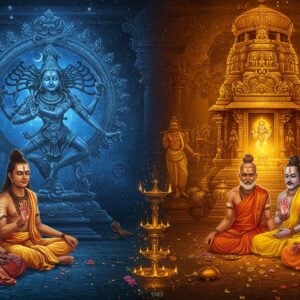
In the rich tapestry of Hindu philosophy, Vishishtadvaita stands as a profound tradition, offering unique insights into the divine and the universe. Pioneered by the revered Ramanuja, this philosophy presents a perspective rooted in Vedantic thought. His teachings continue to shape Hindu practices, especially for those who cherish tradition and ritual. You can explore more about Hindu philosophy and symbolism on Poojn.in through these informative articles: Hindu Philosophy Explained: A Beginner’s Guide and Hindu Symbols Explained: Their Meanings and Importance.
Ramanuja’s Life and Legacy
Ramanuja, born in the 11th century in South India, was a visionary. His early life in the Tamil-speaking region was shaped by his guru, Yadava Prakasha. However, Ramanuja’s differing views on Advaita led him to develop Vishishtadvaita. His magnum opus, ‘Sri Bhashya,’ a commentary on the Brahma Sutras, articulates his philosophical insights. Ramanuja’s impact extended to reforming Sri Vaishnavism practices, making religious knowledge accessible to all castes. Learn more about Dharma and Karma in Hinduism and the global reach of Hinduism’s diverse traditions on Poojn.in: Dharma and Karma in Hinduism Explained and Hinduism’s Global Reach: A Look at Its Diverse Traditions.
Core Tenets of Vishishtadvaita
Vishishtadvaita, meaning ‘qualified non-dualism,’ emphasizes the unity and distinction between the individual soul (jiva) and the divine (Brahman). Ramanuja taught that the soul and universe are real and inseparable from Brahman, a personal God characterized by attributes (vishishta) such as love and compassion. Devotion (bhakti) is central, leading to liberation (moksha).
Comparing Vishishtadvaita with Other Vedantic Schools
Vishishtadvaita offers a different perspective compared to other Vedantic schools. Advaita Vedanta views the world as an illusion (maya), while Vishishtadvaita sees it as a real manifestation of Brahman. Dvaita, championed by Madhvacharya, maintains a dualistic view. These differences shape religious practices, with Vishishtadvaita emphasizing a personal connection with the divine through devotion.
Influence on Rituals and Practices
Ramanuja’s teachings profoundly influenced Hindu rituals, particularly in South India. He emphasized the Pancaratra Agama texts for temple rituals, focusing on the worship of Lord Vishnu. His democratization of religious practice allowed people of all castes to participate in rituals and devotion. The Alvars, Tamil poet-saints, played a significant role in shaping this devotional aspect.
Vishishtadvaita in the Contemporary World
Vishishtadvaita’s relevance persists in balancing tradition with modernity. Its inclusive spirituality resonates with many, and online platforms facilitate the dissemination of Ramanuja’s teachings and access to authentic ritual items. The philosophy provides a framework for ethical living and community service.
How Poojn.in Supports Your Vishishtadvaita Practice
Poojn.in empowers devotees to follow Sri Ramanuja’s Vishishtadvaita tradition with authentic puja items. We provide essentials for daily worship, including Sri Vaishnava Namam sets, pure cotton vastrams, Tulsi malas, brass and copper vessels, pure ghee and oil lamps, Pancharatra agama texts, and traditional conch shells and bells. Holy Cosmetics, Holy Food, Holy Idols, Holy Jewellery, Holy Utensils, and Jaribooti are available for your specific needs. For regular supplies, we offer subscriptions for items like ghee, flowers, and vastrams, ensuring uninterrupted daily puja. Visit www.poojn.in for our full range of Vishishtadvaita worship materials. Our customer service can guide your selection based on your ritual requirements. Some specific product recommendations include the Srimad Bhagavad Gita (Bengali Version), Clay Doat for Saraswati Puja, and Pure Kalwa Off-White Raksha Sutra.
Embracing Vishishtadvaita Today
In today’s fast-paced world, Vishishtadvaita offers solace. Ramanuja’s vision integrates the divine with the everyday, encouraging us to perceive the world as sacred. This philosophy fosters a deep, personal bond with Vishnu, a loving God who is both immanent and transcendent. For those seeking spiritual fulfillment while honoring tradition, Vishishtadvaita serves as a guiding light. It emphasizes devotion and ethical living as pathways to liberation. By making spiritual practices accessible to all, Ramanuja’s teachings cultivate a community grounded in love and service. Online platforms simplify access to this wisdom and necessary ritual items, enabling us to maintain these traditions in modern life. The journey with Vishishtadvaita is one of connection, devotion, and understanding—a timeless path to inner peace.
Understanding Vishishtadvaita: Frequently Asked Questions
Who was Ramanuja? Ramanuja was a highly influential Hindu philosopher and theologian who founded the Vishishtadvaita school of Vedanta. He systematized the philosophical basis of Sri Vaishnavism, a major tradition within Hinduism. His life and teachings continue to inspire countless followers.
What is Vishishtadvaita? Vishishtadvaita, meaning “qualified non-dualism,” is a Vedantic school of thought. It proposes that while Brahman (the Absolute) is the ultimate reality, the individual soul (jiva) and the material world are also real and constitute the body of Brahman. This intricate relationship underscores the interconnectedness of all existence.
What is Ramanuja’s role in Vishishtadvaita? Ramanuja is considered the most important proponent of Vishishtadvaita. He consolidated earlier teachings and provided a comprehensive interpretation of key scriptures, establishing Vishishtadvaita as a prominent philosophical system. His commentaries are essential texts for understanding this tradition.
Why is Ramanuja significant in Hindu philosophy? Ramanuja’s contribution to Hindu philosophy lies in presenting a nuanced perspective on the relationship between God, the soul, and the world. He navigated a middle ground between Advaita’s non-dualism and Dvaita’s dualism, offering a unique perspective that resonates with many. His emphasis on devotion and grace makes his philosophy accessible and deeply meaningful.
What are the central teachings of Vishishtadvaita? Vishishtadvaita emphasizes the real and interconnected nature of God, souls, and the universe, all existing within Brahman. Devotion (bhakti) and surrender to God (prapatti) are key practices for attaining liberation. It teaches that the individual soul retains its identity even after liberation, existing in eternal bliss with God.
How is Vishishtadvaita different from other Vedanta philosophies? Unlike Advaita Vedanta, which posits the world as an illusion, and Dvaita, which sees a complete separation between God and the soul, Vishishtadvaita sees a qualified non-duality. All entities are distinct yet part of a unified whole within Brahman, a concept that differentiates it from other Vedantic schools.
What texts are associated with Ramanuja and Vishishtadvaita? Ramanuja’s commentaries on the Brahma Sutras (Sri Bhashya), the Bhagavad Gita (Gitabhashya), and the Upanishads are foundational texts. These works provide deep insights into the core tenets of Vishishtadvaita. They remain vital resources for scholars and practitioners alike.
How can one practice Vishishtadvaita today? Contemporary practitioners of Vishishtadvaita engage in devotion to God, ethical conduct, and community service. Rituals, prayers, and festivals are integral parts of the practice. The path emphasizes personal transformation through love and surrender to the divine.


